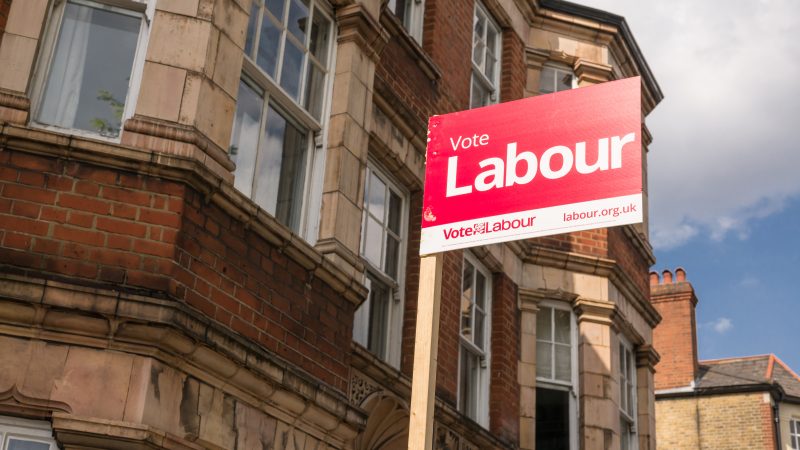
Blue Labour continues to garner attention and gain momentum as our party seeks to make sense of the political realignment taking place across Western democracies. It is a lesser-known school of thought within Labour, having been more bystander than participant in Labour’s recent factional struggles between the Blairites and the Corbynites. So what is it, and why is it so relevant to the moment we are in?
‘Blue Labour’s economics are unashamedly left-wing’
Blue Labour’s politics is about the work we do, the people we love, and the places to which we belong. It is an explicit challenge to the neoliberal, capitalist consensus, and it belongs to the radical labour tradition. A Blue Labour economy would mean a balanced relationship between state, market and society, recognising that large, private corporations now possess far too much power over our country.
Blue Labour’s economics are unashamedly left-wing, seeking public ownership of our public services, so that they are run for the common good and not for private profit. It promotes industrial strategy to rebuild our forgotten towns and to support industries of critical national importance, and suggests shifting taxes towards wealth and unearned income. These pro-worker, left-wing proposals command support across the Labour Party and in the country.
READ MORE: Spending Review: ‘Will the PM keep his five missions front and centre?’
‘Blue Labour principles are shared by the vast majority of the public’
Blue Labour is attacked for being “reactionary” or even “far-right sympathising” by some within the party, precisely because it is much closer to the general public on what we might call the “cultural” issues. Seeking low, controlled immigration, being proudly patriotic, and backing the police as a force for good – these Blue Labour principles are shared by the vast majority of the British public, especially the working classes we exist to represent, but they can be viewed with suspicion within our party.
Those who speak to voters on the doorstep regularly will know that many working class people now see us as a distant, liberal elite, which prioritises anyone but them, to the extent that many working class people now show outright disdain for the Labour Party. We have drifted away from these voters over many decades, and it is not the responsibility of any one leader or their tenure. The local election result last month is one of the final warning calls we will receive before it is too late.
‘Voters want radical change, but we must also show we share their values, not look down on them’
And we do have a choice as to which path to take. We can radically re-orientate our party back towards the working classes we were formed to represent with bold, left-wing economic policies, combined with robust action to significantly reduce migration. Or we can continue being seen as the liberal elite, hoping in vain that the immigration issue will just go away, while post-industrial Britain continues to struggle. We could seek to maintain enough middle-class supporters on those new-build estates which proved so fruitful in 2024 to make up for the fact that our working class base no longer recognises us, while knowing in our hearts that this is not the party we are supposed to be.
Psephologists have long known that the sweet spot of British politics is to the economic left, but with a more “conservative” approach on culture, recognising the importance of the nation, place and family. The voters want radical change to our economic system that only Labour can deliver, but we must also show that we share their values, rather than look down on them.
READ MORE: ‘Progressivism or bust: Why Blue Labour is the wrong answer to Reform surge’
‘Blue Labour can restore working class faith in our democracy’
Blue Labour offers a coherent, popular agenda to radically re-balance and re-shape our economy, so that it works for people across the country, including in our traditional heartlands. It is about the present and future flourishing of our country – not about taking us back to some halcyon past. Taking British Steel into public ownership, calling time on globalisation and acknowledging how voters have been ignored on immigration for 20 years: these interventions all hint at a Blue Labour analysis of what is to be done, but the government must seize this unique moment.
We believe that a Blue Labour government could rebuild our country and restore working class faith in our parliamentary democracy, renewing the covenant between the people, the State, and our commitments to one another. There is no time to waste as we fight to save our country from the populist right.
Subscribe here to our daily newsletter roundup of all things Labour – and follow us on Bluesky, WhatsApp, Threads, X or Facebook.
- SHARE: If you have anything to share that we should be looking into or publishing about this story – or any other topic involving Labour– contact us (strictly anonymously if you wish) at [email protected].
- SUBSCRIBE: Sign up to LabourList’s morning email here for the best briefing on everything Labour, every weekday morning.
- DONATE: If you value our work, please chip in a few pounds a week and become one of our supporters, helping sustain and expand our coverage.
- PARTNER: If you or your organisation might be interested in partnering with us on sponsored events or projects, email [email protected].
- ADVERTISE: If your organisation would like to advertise or run sponsored pieces on LabourList‘s daily newsletter or website, contact our exclusive ad partners Total Politics at [email protected].




More from LabourList
Turning the page? Labour’s recovery in the polls show a path to 2029 victory
Restoration announce recommendations for NEC candidates
‘Factionalism at the top is weakening Labour – and handing a gift to Reform’